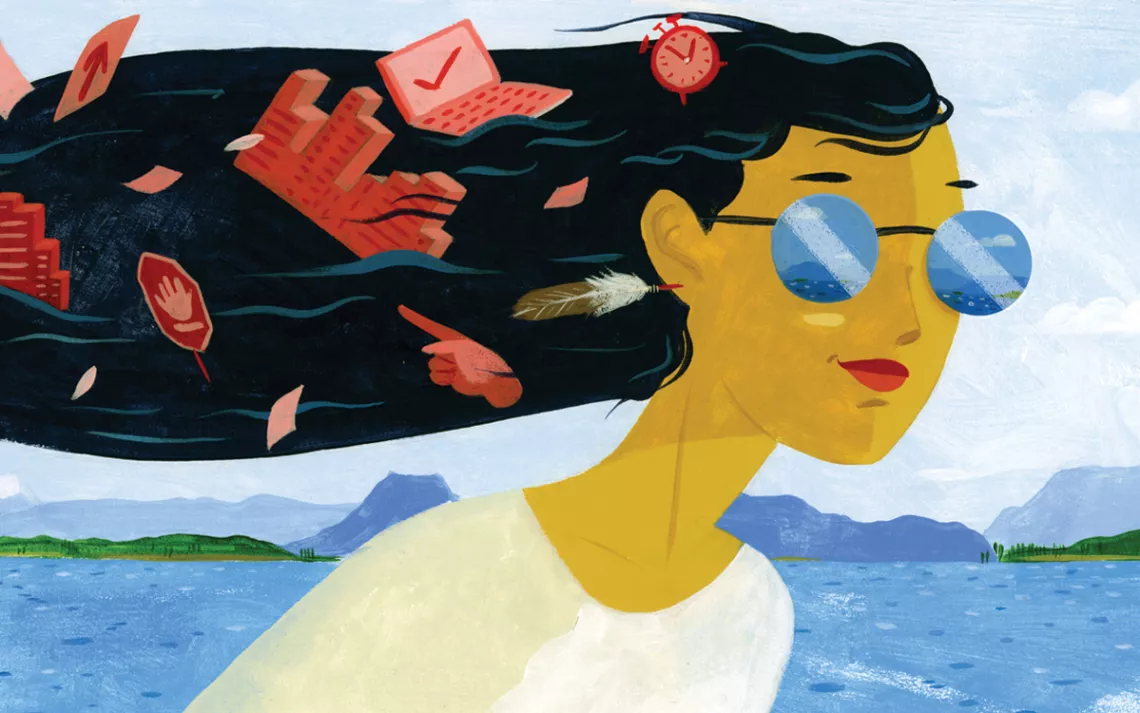How to Be an Islander
Rule 1: Let nature work it out

Illustration by Suharu Ogawa
It was the summer of the birds. In late June, my two kids and I took the ferry from Seattle to a small, remote patch of land in the San Juan Islands, where our family's A-frame cabin sits on an empty stretch of beach. Late winter and spring had been warmer than usual, and many eggs had hatched early. The day we arrived, we found a swallow's nest in the center of an inner tube on the deck. Raven fledglings squawked from the forest. The baby owls screeched at night as if they were hunted prey.
On our second day, a doe ran down the bank in front of our house, landed wrong, and died on the flat spot where the bank meets the beach. My thoughts quickly turned to how I would get rid of the body. Soon she'd smell, and the dog would find her, do what dogs do, and then get sick all over the carpet. As the sun set over Harney Channel, lighting up the ferry that ghosted across the bay, I realized I'd have to drag the doe into the water to be washed away by the tide. My stomach turned.
We'd hardly finished breakfast the next morning when, through the wall of glass that looks down to the beach, I saw a mob of adolescent ravens arrive to feast on the deer, followed quickly by vultures that circled, ate, and aired their wings. Then six bald eagles descended all at once, swooping in and chasing off the other birds before turning on one another. A giant eagle tucked its wings and dove, pointing its white head right at our deck before leveling out and gliding over the water. I clapped my hands with delight and called the children over to watch. During the next hour, the six birds dive-bombed and crashed into one another.
Eventually, the eagles retreated to separate trees—three in one and three in another. That's when I realized there were two families. They shouted at each other in high-pitched shrieks until evening, when all but one left.
As the sun sank low and pink and a seal slapped the water, I noticed that I hadn't moved the doe. The city girl in me wanted to take care of the problem, to check it off the list. The islander in me recognized that this doe wasn't a problem at all. It was, in fact, an awesome gift.
By dinnertime, the doe's stench was seeping through the screen door. I found the dog on the beach, trotting toward the carcass. I resolved to dispose of the doe the next day, and with a shudder I realized it would now require a shovel.
One of the eagle families returned at dawn the next morning and skittishly watched for competitors as they pulled and tore into the meat, then waded into the water to rinse their talons.
That night, under the full moon, an unusually high tide pulled the doe out to sea. Just as quickly as she had come, she was gone. And none of it—neither her arrival nor her departure—had anything to do with me.
I am the third generation of mothers in my family to bring my children to the island, but this ability to let go and be surprised is a lesson I relearn every summer. In our city lives, my kids and I have to be on time and prepared. We have to sit in chairs and listen. But as soon as we step onto the beach, we transform into our adventurous selves. I stop saying things like "get down from there right now" and just let the children climb. We pack picnics and paddle the canoe. We capture crabs in traps and cook them for dinner. We lose our sense of time—and of obligation, too.
Later that summer, I caught a glimpse of something near my driveway—the tip of a gigantic white-and-brown eagle feather. Then I found 10 more. I bundled them and hung them on the wall as a reminder that I don't know how things are going to play out, that I don't need to take care of everything, and that when I don't, I'm often pleased by the result.
Editor's Note: In this article, Katherine Malmo describes collecting eagle feathers from the ground. Neither Sierra nor the Sierra Club condones the gathering of eagle feathers, which is illegal. Malmo donated the feathers to a nearby Lummi Nation.
 The Magazine of The Sierra Club
The Magazine of The Sierra Club



